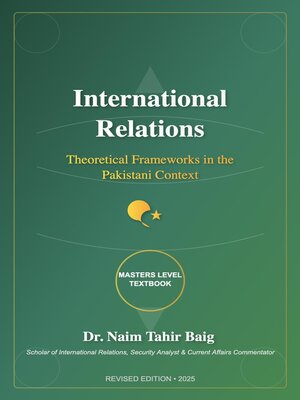International Relations
ebook ∣ Theoretical Frameworks in the Pakistani Context
By Dr Naim Tahir Baig

Sign up to save your library
With an OverDrive account, you can save your favorite libraries for at-a-glance information about availability. Find out more about OverDrive accounts.
Find this title in Libby, the library reading app by OverDrive.



Search for a digital library with this title
Title found at these libraries:
| Library Name | Distance |
|---|---|
| Loading... |
Book Description
International Relations: Theoretical Frameworks in the Pakistani Context (Revised Edition)
International Relations: Theoretical Frameworks in the Pakistani Context presents a comprehensive and critically balanced examination of Pakistan's foreign policy through the lens of major theoretical paradigms in international relations. This revised edition, updated for 2025, offers students, scholars, and policy practitioners an authoritative analysis of how classical and contemporary IR theories apply to Pakistan's complex geopolitical reality as a middle power navigating an increasingly multipolar world.
Dr. Naim Tahir Baig, drawing on three decades of academic excellence masterfully weaves together theoretical rigor with empirical insight to demonstrate how realism, liberalism, constructivism, and critical theories illuminate different aspects of Pakistan's diplomatic strategy. The book moves beyond traditional approaches by incorporating post-colonial perspectives, feminist IR analysis, and emerging theoretical frameworks that better capture the experiences of Global South nations. Each theoretical chapter is enriched with contemporary case studies, from Pakistan's nuclear diplomacy and China-Pakistan Economic Corridor (CPEC) to its evolving relationships with the United States, India, and the broader Islamic world.
What sets this textbook apart is its commitment to intellectual honesty and self-reflection. While presenting Pakistan's perspective with scholarly authority, Dr. Baig does not shy away from critical analysis of policy failures, institutional weaknesses, and strategic miscalculations. The book integrates diverse viewpoints, including perspectives from Indian scholars, Western policy analysts, and international institutions, creating a truly balanced academic resource. Special attention is given to contemporary challenges including terrorism and international image management, climate diplomacy, cyber governance, and the implications of artificial intelligence for foreign policy decision-making.
The revised edition incorporates the most current data and analysis, including the dramatic India-Pakistan crisis of May 2025, recent developments in CPEC implementation, Pakistan's aspirations for BRICS membership, and evolving strategic partnerships in an era of great power competition. With comprehensive appendices featuring primary sources, statistical data, methodological guides, and an extensive bibliography of over 300 sources, this volume serves as both an educational text and a reference work for understanding Pakistan's role in 21st-century international relations.
Designed specifically for masters-level coursework but accessible to advanced undergraduates and policy professionals, the book features learning objectives, discussion questions, primary source excerpts, and suggestions for further reading in each chapter. Dr. Baig's clear prose and analytical framework make complex theoretical concepts accessible while maintaining the intellectual sophistication required for graduate-level study in international relations, South Asian studies, and comparative foreign policy analysis.







